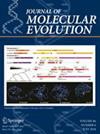复杂性与冗余性互补的概念可以解释康德的生物目的论,并统一机制生物学与终极生物学。
IF 2.1
3区 生物学
Q4 BIOCHEMISTRY & MOLECULAR BIOLOGY
引用次数: 0
摘要
本文章由计算机程序翻译,如有差异,请以英文原文为准。
A Concept of Complementarity Between Complexity and Redundancy can Account for Kant's Biological Teleology and Unify Mechanistic and Finalistic Biology.
求助全文
通过发布文献求助,成功后即可免费获取论文全文。
去求助
来源期刊

Journal of Molecular Evolution
生物-进化生物学
CiteScore
5.50
自引率
2.60%
发文量
36
审稿时长
3 months
期刊介绍:
Journal of Molecular Evolution covers experimental, computational, and theoretical work aimed at deciphering features of molecular evolution and the processes bearing on these features, from the initial formation of macromolecular systems through their evolution at the molecular level, the co-evolution of their functions in cellular and organismal systems, and their influence on organismal adaptation, speciation, and ecology. Topics addressed include the evolution of informational macromolecules and their relation to more complex levels of biological organization, including populations and taxa, as well as the molecular basis for the evolution of ecological interactions of species and the use of molecular data to infer fundamental processes in evolutionary ecology. This coverage accommodates such subfields as new genome sequences, comparative structural and functional genomics, population genetics, the molecular evolution of development, the evolution of gene regulation and gene interaction networks, and in vitro evolution of DNA and RNA, molecular evolutionary ecology, and the development of methods and theory that enable molecular evolutionary inference, including but not limited to, phylogenetic methods.
 求助内容:
求助内容: 应助结果提醒方式:
应助结果提醒方式:


